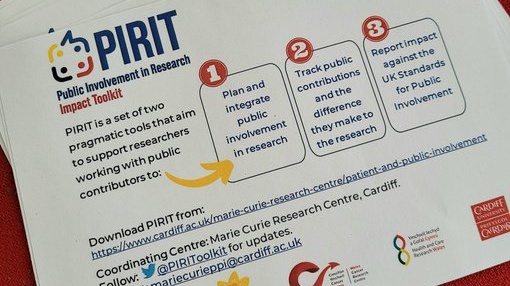
The SERENITY Study, a pioneering Horizon Europe project, aims to revolutionise decision-making support for clinicians, patients with advanced cancer and their carers.
At the heart of this project is the Patient and Public involvement (PPI) team at Cardiff University: Prof Anne Marie Nelson, Dr Michelle Edwards, Dr Elin Baddeley and Dr Kathy Seddon, who are strategically incorporating the PIRIT toolkit (Public Involvement in Research Impact Assessment Tool) as part of their patient and public involvement strategy across six vital work packages.
Shaping the conversation
To begin the conversation, a group of public contributors from the UK actively participated in two workshops. Focused on findings from a realist review of literature on shared decision-making and deprescribing in end-of-life care, the contributors began to share their invaluable insights.
During the first workshop, contributors engaged in discussions on improving communication between doctors, patients, and families in the context of transitioning to comfort care. Key takeaways emphasised the significance of effective communication, the timing of these crucial conversations, and the consideration of individual preferences and cultural sensitivities. These insights became pivotal in the subsequent analysis of the realist review.
In a second workshop, public contributors further enriched the process by reviewing and providing thoughtful commentary on the theory developed from the review findings. This collaborative approach ensured that the patient and public perspective played a central role in shaping the project’s trajectory.
PPI Research Partner Kathy Seddon said:
“It was very interesting to hear the initial findings of the realist review. The group really engaged with them and offered insights from their lived experience. The patients’ viewpoint on conversations with health care professionals added breadth and richness to the findings”.
Impactful engagement in qualitative interviews
The SERENITY Study also tracked the impact of public involvement in a work package focusing on qualitative interviews that explored both clinician and patient experiences regarding antithrombotic medication decisions. Public contributors played a vital role in reviewing participant information, interview guides, and initial themes derived from interview data. Their input ensured that the study encompassed the crucial role of carers in decision-making while preventing participants from feeling overburdened with questions.
PIRIT in action: engaging the SAIL consumer panel
PIRIT is now set to play a key role in an upcoming activity with the SAIL consumer panel at Swansea University. This engagement aims to gather the panel’s views on epidemiological data collected from a cohort of cancer patients in Wales. This data, a part of another SERENITY work package, will significantly contribute to informing the development and evaluation of the shared decision-making tool. The SAIL panel engaged enthusiastically with SERENITY and the discussion produced some great insights for the next stages of the project such as the potential use of AI in the decision aid tool.
Looking ahead: PIRIT and the future of the SERENITY Study
As the SERENITY Study progresses, PIRIT will continue to help to guide research. Future plans involve using PIRIT in a Delphi Consensus study to decide the content of the shared decision-making tool. Public contributors will be actively involved in developing components for the tool and participating in the evaluation through a randomised controlled trial.
At the end of the study, a comprehensive report will be provided to the PIRIT team, highlighting the strategic use of PIRIT and its effectiveness in enhancing patient and public involvement within the SERENITY Study. This new approach not only reshapes the landscape of cancer research but also sets a precedent for the power of collaborative decision-making in medical research projects.
PPI Research partner Kathy Seddon said:
“It is a real pleasure to be part of this ground-breaking use of PIRIT as part of the SERENITY PPI strategy. As one of its designers it is exciting to see the flexibility it offers in use.”
To download the PIRIT toolkit, please visit the website.